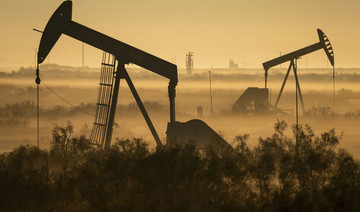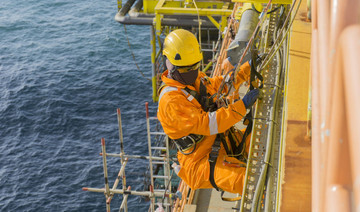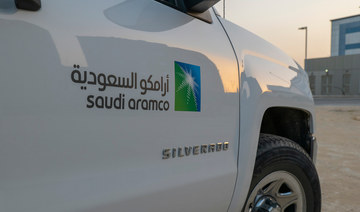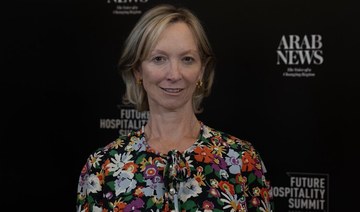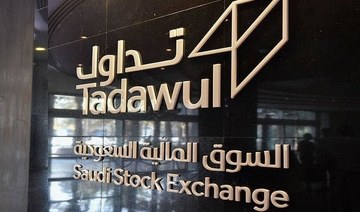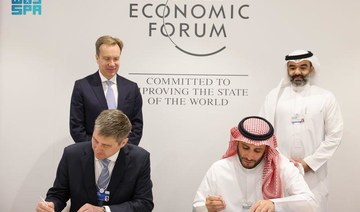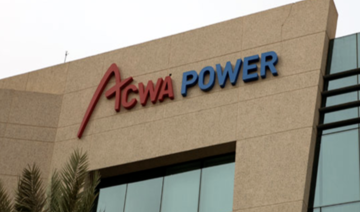SINGAPORE: Oil prices nudged higher on Friday on signs of surging demand in China, the world’s second-biggest oil user, though prices are set to fall for a second week amid concerns of the ongoing Sino-US trade war is limiting overall economic activity.
Brent crude oil futures were trading at $79.51 per barrel at 0521 GMT, up 22 cents, or 0.3 percent, from their last close.
US West Texas Intermediate (WTI) crude futures were up 19 cents, or 0.3 percent, at $68.84 a barrel.
For the week, Brent crude was 1.1 percent lower while WTI futures were down 3.5 percent, putting both on track for a second consecutive weekly decline.
Refinery throughput in China, the world’s second-largest oil importer, rose to a record high of 12.49 million barrels per day (bpd) in September as some independent plants restarted operations after prolonged shutdowns over summer to shore up inventories, government data showed on Friday.
The refinery consumption may rise through the fourth quarter as several state-owned Chinese refiners return to service after maintenance.
Undermining the strong refinery data, China did on Friday report its weakest economic growth since 2009 in the third quarter, with gross domestic product expanding by only 6.5 percent, missing estimates.
The weak economic data raised concerns that the country’s trade war with United States is beginning to have an impact on growth, which may limit China’s oil demand.
The trade war concerns combined with surging US oil stockpiles reported on Thursday are capping the day’s price gains.
US crude stocks last week climbed 6.5 million barrels, the fourth straight weekly build, almost triple the amount analysts had forecast, the US Energy Information Administration said on Wednesday.
“EIA Weekly Petroleum Status Report was a complete shocker sending Oil markets spiraling lower amidst some concerning development for oil bulls,” said Stephen Innes, head of trading APAC at OANDA in Singapore.
Inventories rose sharply even as US crude production slipped 300,000 barrels per day (bpd) to 10.9 million bpd last week due to the effects of offshore facilities closing temporarily for Hurricane Michael.
Meanwhile, Iranian oil exports may have increased in October when compared to the previous month as buyers rush to lift more cargoes ahead of looming US sanctions that kick in on Nov. 4.
An unprecedented volume of Iranian crude oil is set to arrive at China’s northeast Dalian port this month and in early November before US sanctions on Iran take effect, according to an Iranian shipping source and data on Refinitiv Eikon.
So far, a total of 22 million barrels of Iranian crude oil loaded on supertankers owned by the National Iranian Tanker Co. are expected to arrive at Dalian in October and November, the data showed. Dalian typically receives between 1 million and 3 million barrels of Iranian oil each month, according to data that dates back to January 2015.
Oil prices edge up, but set for weekly loss on inventory build, US-China trade row
Oil prices edge up, but set for weekly loss on inventory build, US-China trade row
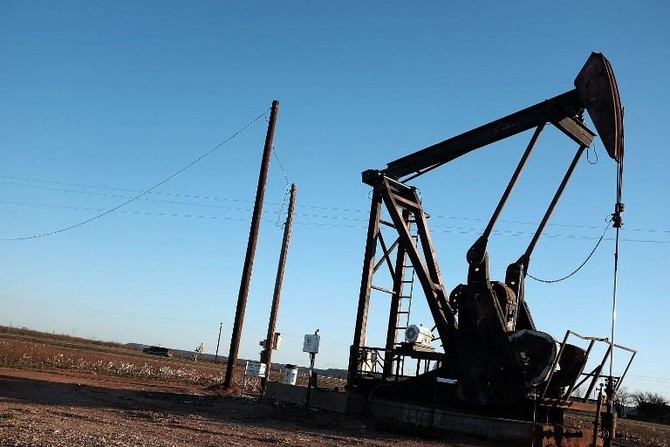
- US crude stocks last week climbed 6.5 million barrels, the fourth straight weekly build, almost triple the amount analysts had forecast
- An unprecedented volume of Iranian crude oil is set to arrive at China’s northeast Dalian port this month
Aramco acquires 40% stake in GO, marking first entry into Pakistani fuel retail market
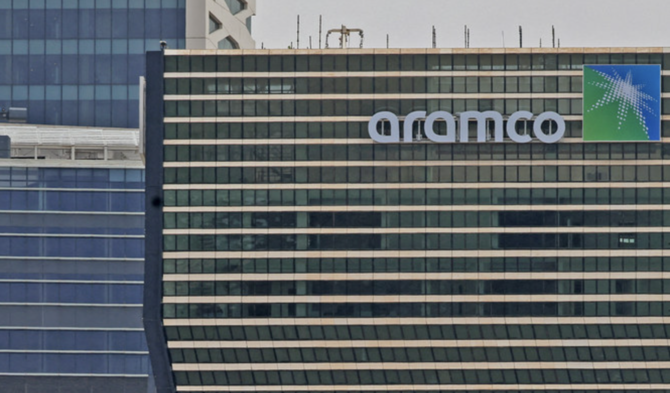
- Saudi oil giant Aramco inked agreement to buy 40 percent stake in Gas and Oil Pakistan Ltd. in December 2023
- Acquisition to bring much-needed foreign direct investment in Pakistan’s energy sector, says competition commission
KARACHI: The Competition Commission of Pakistan this week approved Saudi oil giant Aramco’s decision to acquire a 40 percent stake in local company Gas & Oil Pakistan Ltd, officially marking the Saudi company’s entry into Pakistan’s fuels retail market.
Aramco and Gas signed the agreement to acquire 40 percent stake in Gas and Oil Pakistan Ltd., a licensed oil marketing company, in December 2023.
Gas and Oil Pakistan Ltd. is involved in the procurement, storage, sale, and marketing of petroleum products and lubricants. It is also one of Pakistan’s largest retail and storage companies.
Aramco is a global integrated energy and chemicals company that produces approximately one in every eight barrels of the world’s oil supply and develops cutting-edge energy technologies.
Aramco Asia Singapore Pte. Ltd., a Singaporean company wholly owned by Saudi Aramco, filed the pre-merger application with the CCP. It specializes in sales, marketing, procurement, logistics, and related services, with a focus on prospecting, exploring, drilling, extracting, processing, manufacturing, refining, and marketing hydrocarbon substances.
“The Competition Commission of Pakistan approved a 40 percent equity stake acquisition in Gas & Oil Pakistan Ltd. by Aramco, a global leader in integrated energy and chemicals,” the CCP said in a statement on Monday. “This transaction marks Aramco’s first entry into Pakistan’s fuels retail market, underscoring its confidence in the country’s economic potential and its commitment to its growth.”
The CCP said it had authorized the merger after determining that the acquisition would not result in the acquirers’ “dominance” in the relevant market post-transaction.
“Aramco’s acquisition indicates a significant milestone in Pakistan’s energy sector, bringing advanced expertise and technology to the fuels retail market,” it said. “This development is expected to boost competition, elevate service standards, and provide consumers with a broader range of high-quality products.”
The CCP said the acquisition would help bring much-needed foreign direct investment in Pakistan’s energy sector, contributing to economic growth and development of the country.
In February 2019, Pakistan and Saudi Arabia inked investment deals totaling $21 billion during the visit of Saudi Crown Prince Mohammed Bin Salman to Islamabad. The agreements included about $10 billion for an Aramco oil refinery and $1 billion for a petrochemical complex at the strategic Gwadar Port in Balochistan.
Pakistan’s Prime Minister Shehbaz Sharif, who is in Saudi Arabia for a special meeting of the World Economic Forum, held meetings this week with Saudi Arabia’s ministers of energy, economy and planning, and environment, according to his office.
In a meeting with Saudi Energy Minister Prince Abdulaziz bin Salman on Monday evening, Sharif highlighted initiatives undertaken by Pakistan to facilitate investment in the energy sector. The Saudi side showed keen interest in Pakistan’s energy projects highlighted by Sharif, the Prime Minister’s Office said.
The proposed projects included building new and improving existing energy infrastructure, increasing focus on renewable energy, and bringing efficiency across entire energy ecosystem in Pakistan, according to the statement.
Pakistan and Saudi Arabia enjoy strong trade, defense and cultural ties. The Kingdom is home to over 2.7 million Pakistani expatriates and serves as the top source of remittances to the cash-strapped South Asian country.
Both countries have been closely working to increase bilateral trade and investment deals, and the Kingdom recently reaffirmed its commitment to expedite an investment package worth $5 billion.
IHG’s luxury brand Hotel Indigo set to debut in Alkhobar, expanding Saudi footprint

RIYADH: The Saudi hospitality landscape is poised to welcome a new luxury hotel brand following a management agreement between UK-based IHG Hotels & Resorts and REFAD Real Estate Co.
Signed on the sidelines of the Future Hospitality Summit in Riyadh, the deal will bring the lifestyle brand Hotel Indigo & Residences, featuring 200 keys, to Alkhobar by September 2027.
Supported by the Kingdom’s Tourism Development Fund, the hotel will also include serviced apartments.
Speaking to Arab News, Haitham Mattar, managing director at IHG Hotels & Resorts in India, Middle East and Africa, said: “It’s on the corniche of Alkhobar. It brings authentic, cultural experiences into the hotel, and this is where we found this unique partnership with Refad. Their interest in the brand, also the brand positioning in Saudi Arabia.”
He revealed that the company has so far signed five Hotel Indigo hotels in Saudi Arabia.
The executive also noted that the luxury brand is expanding in the Middle East, following the success of an existing Hotel Indigo in Dubai.
Commenting on the agreement, Mattar said: “This strategic addition not only fuels our growth in Saudi but also reaffirms our commitment to providing exceptional hospitality experiences in key markets.”
He continued: “With the Kingdom having increased its 2030 visitor target from 100 to 150 million, there is a need to bring in lifestyle hotels offering compelling guest experiences that will only further strengthen its robust hospitality sector in line with the goals of Vision 2030.”
Mattar further elaborated on the significant investment and expansion plans for the hotel industry in Saudi Arabia over the next three to five years, including SR2.5 billion ($667 million) to renovate and upgrade existing facilities.
"His Excellency, Ahmed Al-Khateeb, the minister of tourism, has given us a very specific mandate to ensure that we uplift and elevate our hotel product,” he said.
This is to “to ensure that these hotels are well-positioned to receive international travelers, that the ministry and the government are seeking. We have a commitment from our owners to staff that are waiting, especially our Intercontinental brand,” Mattar added.
The managing director said the focus is on the Intercontinental brand, which currently has 10 to 11 hotels in Saudi Arabia and is part of a broader pipeline of 39 new hotels set to open across the region.
“We have a huge concentration of hotels coming up in the Makkah Medinah area, but also we are going into the secondary market. So, for example, Hotel Indigo is also going to Abha, in the Asir region, a very special location as well, in the mountains of Saudi Arabia, and we are also covering new opportunities in Riyadh, Jeddah, as well as Eastern Province,” Mattar explained.
As part of Saudi Arabia’s tourism strategy, which involves developing ten key destinations focusing on a mix of major cities and lesser-known regions, the list of destinations includes Madinah, Riyadh, and several secondary and tertiary markets like the Asir region, Qasim, and Al-Jouf, as well as Jazan, Abha, and Baha.
“This is where, you know, the natural assets of Saudi Arabia are. This is where the future of tourism is going to be. This is where the cultural and historical sites are also placed, and some of the places, as I see it,” Mattar emphasized.
He added that the Ministry of Tourism focuses on exploiting those assets and showcasing them to the world, emphasizing that it’s not just about city escapes in Riyadh and Jeddah, but also about the historical and spiritual offerings in Makkah and Madinah.
Hotel Indigo and Residence will provide guests with a range of dining options, including the Neighborhood Café and Lobby Lounge, as well as an Executive Lounge for a diverse culinary experience.
Business travelers will have access to facilities, including five meeting rooms and a ballroom spanning 290 sq. m., all equipped with the latest technology.
Closing Bell: Saudi main index gains 25 points to close at 12,395

RIYADH: Saudi Arabia’s Tadawul All Share Index continued its upward momentum for the second consecutive day, gaining 25 points to close at 12,394.91.
The total trading turnover of the benchmark index was SR7.47 billion ($1.99 billion) with 187 of the listed stocks advancing and 36 declining.
The Kingdom’s parallel market Nomu also edged up by 0.41 percent to 26,336.28.
However, the MSCI Tadawul Index shed 9.12 points to close at 1,560.69.
Makkah Construction and Development Co. was the best-performing stock of the day with its share price surging by 7.88 percent to SR106.80.
Other top performers on the main market were National Agricultural Development Co. and Saudi Reinsurance Co., whose share prices soared by 7.34 percent and 7.23 percent respectively.
The worst performer on the benchmark index was Saudi Electricity Co., as its share price slipped by 3.72 percent to SR18.62.
On the announcements front, ACWA Power said that shareholders approved the board of directors’ recommendation to distribute a cash dividend of SR0.45 per share for 2023.
Shareholders of the utility developer also green signaled the board’s recommendation to increase capital by SR14.62 million from retained earnings.
On Tuesday, Almunajem Foods Co. said that it signed a share purchase agreement with Balady Poultry Trading Co.
Under the deal, Almunajem Foods Co. will buy a 23 percent stake from Balady Poultry Trading Co.’s shareholders totalling SR181.33 million.
The company, in a Tadawul statement, revealed that the deal will be completed only after obtaining the necessary approvals from the relevant authorities, including the Kingdom\s General Authority for Competition.
Meanwhile, Yamama Cement Co. announced its financial results for the first quarter of this year.
In a Tadawul statement, the cement manufacturer said that its net profit increased by 2.34 percent in the first three months of 2024 to SR115.03 million, compared to the same period of the previous year.
The company attributed the rise in profit to lower cost of sales and higher revenues.
The National Co. for Glass Industries, also known as Zoujaj revealed that its net profit in the first quarter of this year surged by 166.27 percent to SR22.9 million, compared to the same quarter of the preceding year.
Sudan to pursue nuclear energy, exploit gold resources: Energy minister
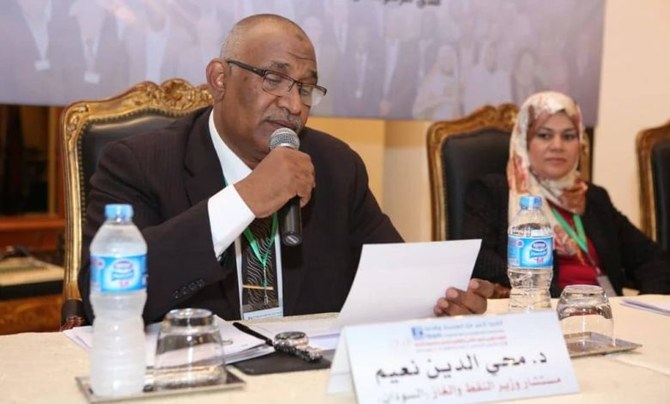
- Energy, mining ministries combined, says official at WEF meeting
- Nuclear power will ‘accelerate’ industrial developmental progress
RIYADH: In a bid to boost the country’s development, Sudan has consolidated its energy and mining ministries, and is pursuing nuclear power as a source of electricity, a senior official said at the World Economic Forum here on Monday.
Speaking to Arab News, Minister of Energy and Petroleum Moheiddin Naeem Mohamed Saeed said the merging of the ministries is aimed at capitalizing on the nation’s gold resources. Pursuing nuclear energy would boost the war-torn country’s development, he added.
“Sudan’s significant gold production will be leveraged to drive development in other sectors,” the minister said.
Meanwhile, Saeed said that he found the discussions on nuclear energy during the WEF event beneficial, adding that his country has begun the process of developing its nuclear-power sector.
“Having completed the initial two steps, it is now high time to seriously consider nuclear energy, given it is safe. This action will accelerate Sudan’s industrial and developmental progress, potentially spearheading reforms in the energy sector, which is a key indicator of a country’s level of development,” Saeed said.
He said that discussions around energy were critical for all nations. “Energy is no longer a private matter; it is a concern that resonates worldwide. Access to energy is a fundamental right for people everywhere. With the evolving quality of life, energy has become indispensable. From household appliances to industrial machinery, our modern way of life relies heavily on energy,” he said.
Saeed added that the WEF special meeting provides a platform for participants to discuss different energy sources and strategies for investing in them optimally, while keeping costs as low as possible, and developing industry standards.
“This forum seeks to unite the global regulations and provide safe and available energy,” he said.
Saeed said Sudan was developing relations with other nations with regard to energy provision. “We have a power interconnection with Ethiopia, and we have a power interconnection with Egypt; they are our neighbors. We have a big goal to achieve in Africa, which is to pursue this interconnection. So, African countries exchange energy,” he said.
He emphasized that Africa, known for its economic challenges, requires collaborative efforts among its nations to address energy issues effectively. “Energy has become an indicator of whether a country is advanced or not, as I previously said. They strive to integrate electricity and energy in general.”
Saeed said that as an oil-producing country, Sudan had undertaken projects with China and Malaysia. “In early 2000, our oil production reached 500,000 bpd (barrels per day), after the country split into two with the establishment of South Sudan, where most of the oil projects were located.
“Our big challenge now is to cooperate with oil old players or the new ones everywhere, as we have no political issues with any country, and this is business. We have a substantial oil reserve in the north,” he said.
He said Sudan has only exploited 20 percent of its known oil reserves for energy, and the government was striving to maximize production due to high demand.
“We currently meet 40 percent of our energy requirements. Additionally, we have initiatives in solar, thermal and wind energy to generate electricity. Moreover, our river systems, supported by numerous dams, contribute to half of Sudan’s power supply, and we are making significant progress in this area.”
On gas, he said Sudan has potential fields in the Red Sea, and are transitioning electricity stations to utilize more of this source.
Saudi minister stresses energy security importance amid climate concerns
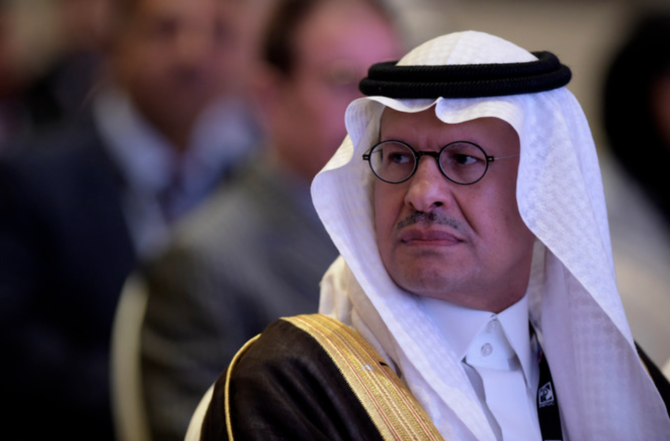
RIYADH: Energy security does not need to be sacrificed to deal with climate concerns, one of Saudi Arabia’s top ministers has insisted.
The Kingdom’s Energy Minister Prince Abdulaziz bin Salman flagged made the comments at a dialogue session titled “Energy Security, Future of Energy, and Sustainable Development” during the 2024 IsDB Group Annual Meetings in Riyadh.
His warning come as climate change discussions now include a focus on innovative solutions such as renewables and advanced technologies while ensuring energy security and economic growth.
Prince Abdulaziz stated: “We believe in the reality of the climate crisis, but we support dealing with it according to the priorities of each country.”
He added: “Our issue is not recognizing the existence of the problem of climate change, but rather how to deal with it in a fair and direct manner, taking into account the differences in the national circumstances of countries.”
The minister stressed the importance of collaboration and collective action, noting Saudi Arabia’s proactive engagement on global warming.
“The Kingdom has the second lowest intensity of carbon dioxide and methane emissions in the world, and countries that occupy lagging positions must follow our approach,” he emphasized, urging nations to unite and work together toward effective solutions.
“The discussion on the issue of climate change must be realistic and logical to enable all parties to cooperate in confronting this global issue,” the minister added.
The energy minister joined a growing chorus of high-profile figures discussing the trade-offs between energy security and climate concerns.
In March, President and CEO of Aramco Amin Nasser called for a new approach to the energy transition that incorporates oil and gas, saying the current strategy “is visibly failing on most fronts.”
Speaking at the same meeting as Prince Abdulaziz in Riyadh, Muhammad Al-Jasser, president of the Islamic Development Bank, highlighted the institution’s commitment to green projects through innovative financing mechanisms.
“Anytime you have a green project, you can issue sukuk against it. Once you have those green sukuks, you can create green assets against it and then you have a virtual cycle triggered into the process and we’re already there,” he explained.
Al-Jasser emphasized the bank’s proactive approach to catalyzing change rather than waiting for it.
“This year is going to be a bumper year for us, we’re going to be issuing $6 billion of sukuk; some of it will be green. This is our way of helping and not waiting too long to bring about that change,” he said.
Addressing the financing challenges associated with the energy transition, he emphasized the progress made by IsDB in increasing funding for sustainable projects.
“We will provide financing within our abilities and we do it with also all of the other Arab lending institutions,” he explained.
He continued: “There’s the Arab Coordination Group, we compare notes and we go out and we finance some of these projects like the hydro dams that we have financed together and that helps a lot with the transition and with the creation of sufficient energy to fuel these economies.”
However, he acknowledged the financial constraints and emphasized that the transition must be realistic and inclusive, stating: “We will never have enough money, and therefore the transition has to take that into account.”


